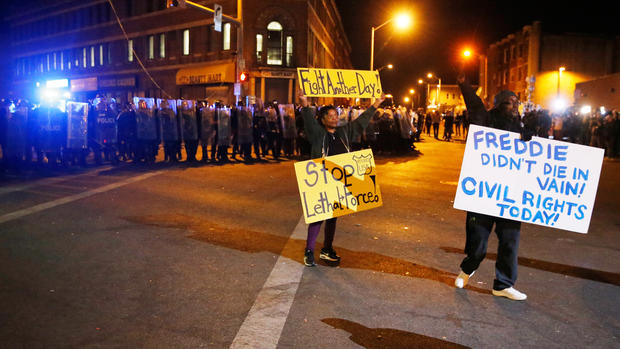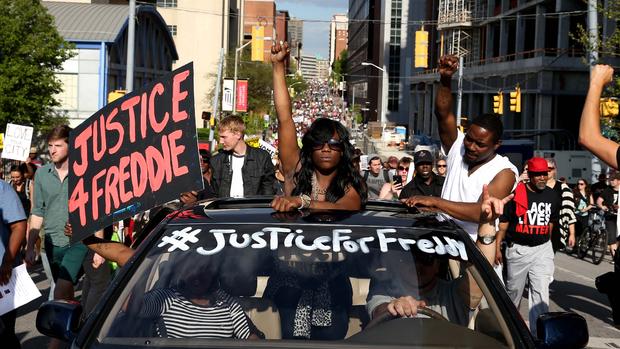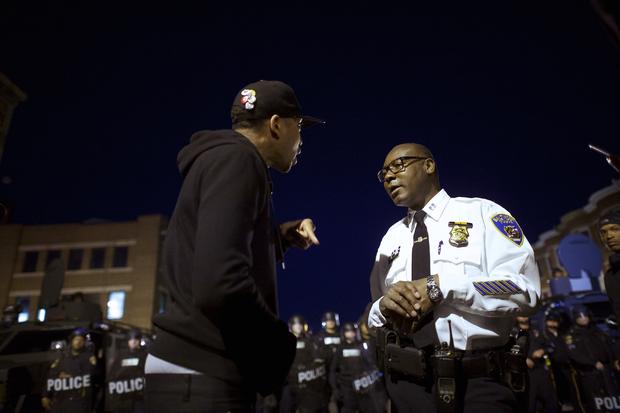Baltimore, hoping to avoid unrest, goes under curfew
BALTIMORE -- An all-night curfew went into effect in Baltimore Tuesday night, a day after major social unrest that left one person critically injured, 20 police officers hurt, more than 200 people arrested, and major property damage after the funeral of Freddie Gray, 25, who died in police custody.
Just after the curfew went into effect, crowds remained in the streets in some parts of the city as police waited to see if people would clear the streets. Some in the crowds, refusing to leave, instead began lobbing smoke canisters and water bottles at police who deflected them with their shields. However, within an hour of the curfew doing into effect, the streets were largely cleared.
Mayor Stephanie Rawlings-Blake announced the 10 p.m. through 5 a.m. curfew Monday night after an afternoon of clashes with police, vandalism and multiple building and vehicle fires throughout the city. It is expected to last a week. The move came along with a state of emergency being declared in Baltimore by Maryland Gov. Larry Hogan, and activation of National Guard troops.
"We're not going to have another repeat of what happened last night," Maryland Gov. Larry Hogan vowed after a visit to a West Baltimore neighborhood where cars were burned and windows smashed. "We're going to make sure we get Baltimore back on track."
Hogan said there are "a couple of thousand" National Guardsmen and police officers in Baltimore, with more on the way.
It was the first time the National Guard was called out to quell unrest in Baltimore since 1968, when some of the same neighborhoods burned for days after the assassination of the Rev. Martin Luther King Jr.
Just before 9 p.m., a crowd of several hundred remained on the street near where a CVS pharmacy was looted.
A line of self-appointed peacekeepers could be seen pushing the crowd back from a line of police that had been blocking the street all day.
A local pastor could be heard on the loud speaker urging residents to go home and respect the curfew. "Let's show the world, because the eyes of the world are on Baltimore right now."
At the White House, President Barack Obama called the deaths of several black men around the country at the hands of police "a slow rolling crisis." But he added that there was "no excuse" for the violence in Baltimore, and said the riots should be treated as criminals.
The streets were calm Tuesday morning. Residents of one neighborhood were already showing up with brooms and trash cans to try to clean up the street, a CBS News producer reports, adding that several people with shovels and brooms were outside the CVS. All were volunteers.
Firefighters could be seen spraying the burned-out shell of a large building.
Hardware stores donated trash bags and brooms, and city workers brought in trucks to haul away mounds of trash and broken glass.
With schools closed, Blanca Tapahuasco brought her three sons, ages 2 to 8, from another part of the city to help sweep the brick-and-pavement courtyard outside a looted CVS pharmacy.
"We're helping the neighborhood build back up," she said. "This is an encouragement to them to know the rest of the city is not just looking on and wondering what to do."
Helmeted officers blocked a stretch of North Avenue in the neighborhood where Freddie Gray, 25, was arrested earlier this month in a case that has become the latest flashpoint in the national debate over the police use of deadly force against black men.
But the focal point of the violence is the lack of answers in Gray's case. He was arrested April 12 after running away at the sight of police, authorities said. He was held down, handcuffed and loaded into a police van. Leg cuffs were put on him when he became irate inside. He died of a spinal cord injury a week later.
Authorities said they are still investigating how and when he suffered the injury - during the arrest or while he was in the van, where authorities say he was riding without being belted in, a violation of department policy. Six officers have been suspended with pay while the investigation continues.
Incidents like this, in addition to poverty, and few employment opportunities have exacerbated tension between residents and the police.
"I mean personally, I ain't going to lie to you, I don't like the police, just because of what they keep doing to my people -- my people. My black people," Melvin Towns, 16, told CBS News correspondent Jeff Pegues, explaining that people are furious. "It's beginning to become a routine with us. With the police."
Just prior to 10 p.m., loudspeakers began to sound off instructing crowds still present in the streets to disperse. Citizens, apparently eager to avoid any repeat of the previous day's violence, began to form lines in front of the crowds, shouting for them to go home.
Overall, the day was peaceful in the city. Crowds of protesters returned, but mainly held picket signs and remained non-confrontational. However, CBS Baltimore reported officers were making arrests in South Baltimore. Police say a group started attacking officers with rocks and bricks at Patapsco and 9th Street.
At least one officer was hurt, according to city police.


